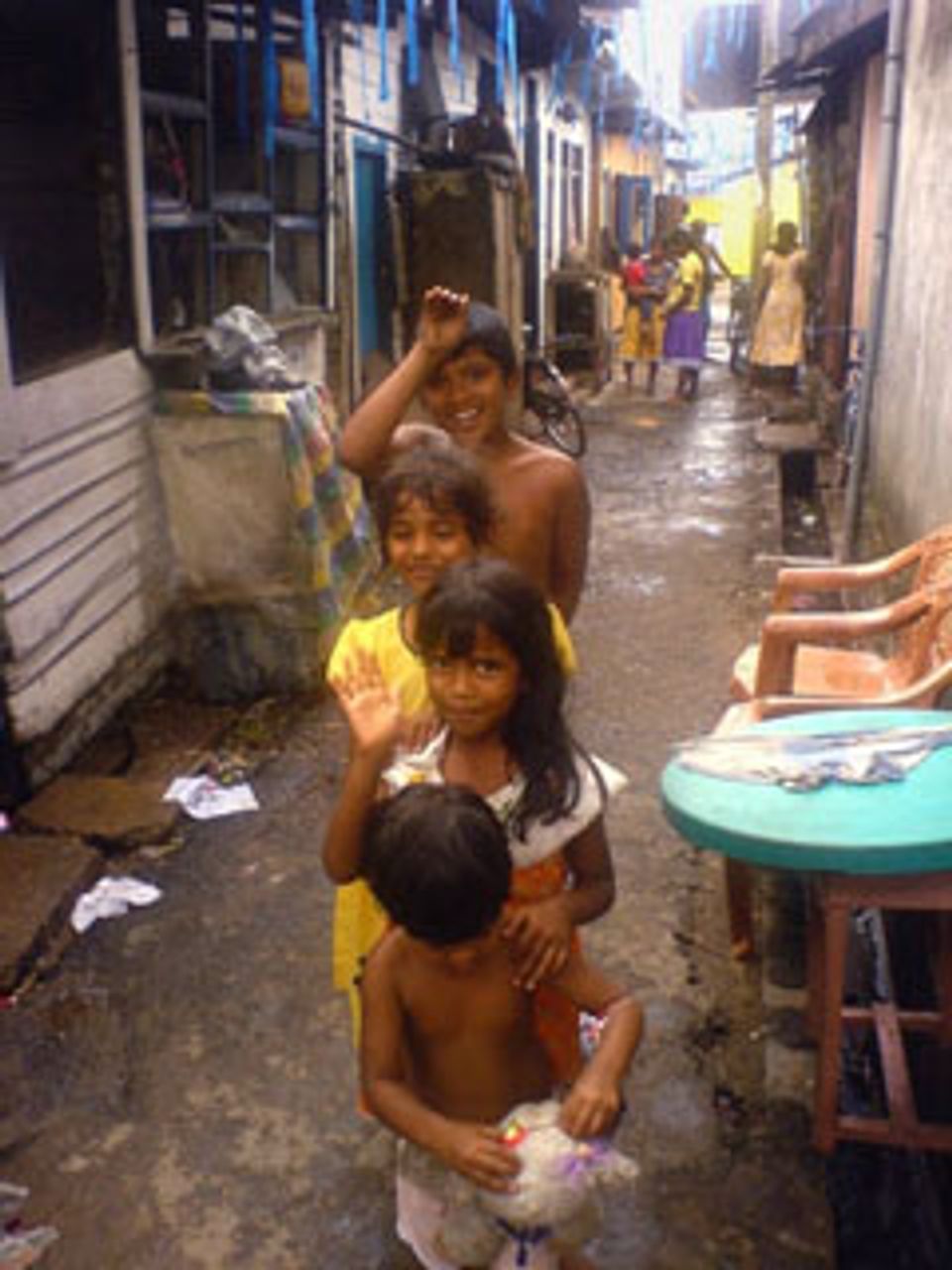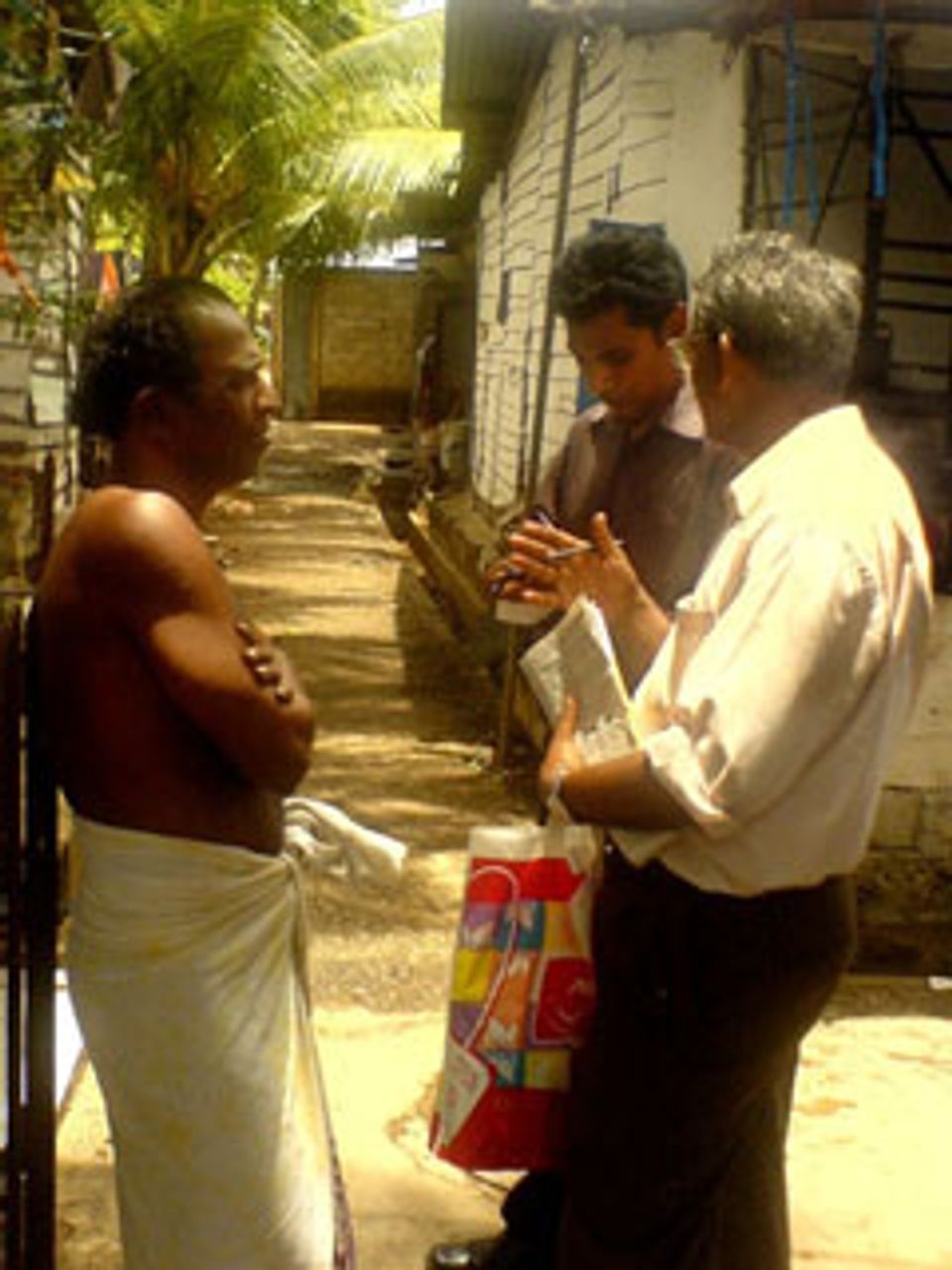Government and opposition candidates for the Colombo district in the April 8 general election have been rushing to the shanty areas of the capital appealing for votes with promises of good housing.
President Mahinda Rajapakse suddenly announced a “Nagamu Purawara” (Let’s Develop the City) program in mid-February and accused municipal authorities of “ignoring” the shanty people. Rajapakse’s move was not to help the poor, but to get votes. Most people in the Colombo district voted against him in the January presidential election.
Rajapakse even appeared on television at a shanty near his official residence, Temple Trees, smiling and greeting old people and small children. His party’s candidate promised that the area would be uplifted as well. The program was due to be completed by March 25, but nothing has changed except that a few alleys have been cemented.
According to a 2006 government survey, 54 percent of households of Colombo City’s population of 647,100 live in huts and slums.
 Shanty town laneway
Shanty town lanewayMost residents have no legal right to their shelters. Many have migrated from remote villages, often many years ago, to look for jobs in Colombo. The dwellings are constructed of plaited palm leaves, old planks and corrugated iron sheeting. They are overcrowded, lack ventilation and are built alongside canals, on river banks and on highway and railway reservation lands. Many of these areas are low lying and flood during heavy rains.
An official 2006 survey found that 43,462 families in Colombo do not have access to clean drinking water. The shanties often suffer from inadequate drainage and accumulated garbage. The majority of residents do not have any form of solid waste collection service. Some 27 percent of the poor urban settlements do not have proper inner access roads. Most residents have no permanent income. Only 12 percent of shanty households, or 9,314 families, have a permanent source of income while 45 percent or 34,925 families are engaged in unskilled, irregular employment.
To date, only one new housing complex—“Sahasapura” (Millennium City) at Dematagoda in Colombo—has been constructed to provide better housing for shanty dwellers. Built in 2001–2002, it provided 676 housing units for families from 16 settlements. The government boasted that as a result it was able to free up 7 hectares of prime real estate worth 900 million rupees ($US8 million).
The scheme was established under the Sustainable Township Program, which was backed by the World Bank. Real Estate Exchange Ltd (REEL), which managed the project, defined its aim as follows: “In order to attract direct foreign investment, it is essential to provide cheap labour, especially suitable land areas within the city of Colombo, and infrastructure facilities.”
 Resident speaks with WSWS journalists
Resident speaks with WSWS journalistsA Socialist Equality Party (SEP) campaign team recently visited Sahasapura and a nearby shanty.
Karunapala, who works at a steel company, lives in a shanty area named T-twenty. “I came here in 1972,” he said. “Politicians visit us during elections. They come here for votes but no one has intervened to solve our housing problem. I saw the president on TV walking around and inspecting a slum like area promising to develop it. Certainly, that is bogus.”
He continued: “We have no deeds to our homes and land. No proper infrastructure is available. We use common toilets. There are about 500 families living here. Only six toilets are available. Many families use the drainage canal for their toilet purposes. The prison waste is also thrown into the same drain. We complained to the municipal authorities about the overflowing drainage, but no avail.”
Sivapalan lives in the same shanty area. “Every capitalist government has discriminated against Tamils,” he said. “My father is from the plantation area. Now I am here doing odd jobs to live. We thought peace would come after the end of war [against Liberation Tigers of Tamil Eelam, LTTE]. But we feel it is a dream. We are still afraid to speak up. Because of the LTTE attacks, Sinhalese people became angry with us. But it is wrong to think that all Tamils are LTTE. Tamil and Sinhalese people lived here as friends before the war, but politicians divided us.”
Nimala lives in a small hut with her husband and four children. She explained that residents in her area had been cheated by politicians and deprived of basic facilities. “I make dresses at home and sell them. My husband is a driver. Our income is not enough to live on as the price of essentials keeps going up. Without an adequate income, people here cannot provide proper food for their children. Small children here are suffering from malnutrition.
“Various individuals come here at election time and promise to provide houses. Some of them even take measurements. This has been happening since I was born. Even if we were given houses, they would be small. I would love to live in cleaner surroundings.”
From a distance, Sahasapura looks like a model housing project. But when you speak to people it is different. The residents readily express their anger and discontent at the government and politicians in general.
A housewife explained: “Now the life is hard here. We feel that it would be good to sell this and relocate somewhere else. The waste bin is full but it is not emptied. It is unbearable. Before moving here we were at a nearby housing estate. The government took 25,000 rupees from us for this house. We were told the money was for maintenance, but there is no maintenance. We have to pay for water and electricity. The monthly electricity and water bills are skyrocketing. As we are unable to pay, the bills accumulate. We also have to pay 150 rupees in quarterly tax to the municipal government. We cannot afford all this as our income is falling.”
Ranjith, 52, who also lives at Sahasapura, said: “As youth have no jobs, some people are engaged in anti-social activities like selling drugs, illegal breweries and prostitution. With enormous difficulties, I managed to send my son to the university. He is now 30 years old. Just two months ago he got a job but he gets a small salary. He is still unmarried as he does not have an adequate income for a family.”
Asked about political situation, Ranjith disagreed with the Rajapakse government’s arrest of the opposition presidential candidate, retired general Sarath Fonseka, on unsubstantiated allegations that he was planning a coup. “There is no democracy in this country. What will be the future of our children?” he said. Ranjith expressed concern that the government would use terror against working people to hold onto power.
